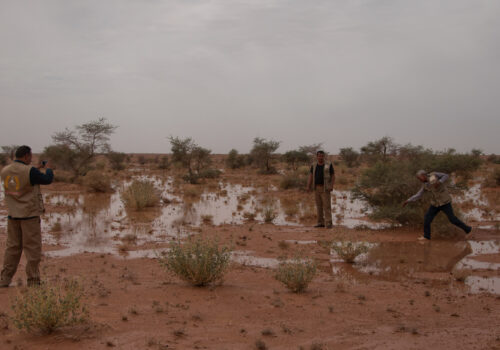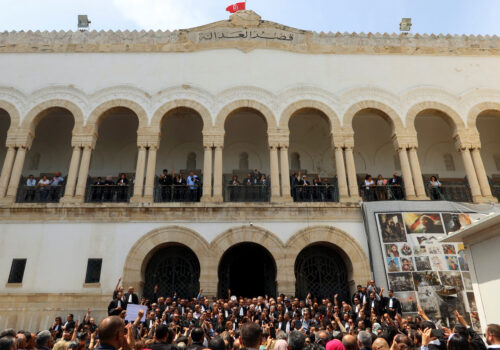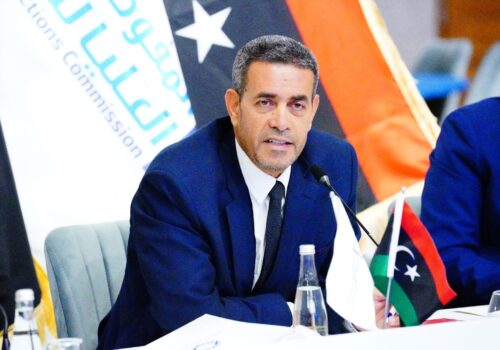A world in crisis is good news for North Africa’s political elites
In an era of significant global turbulence and intense human tragedy, North African governments have demonstrated that there is opportunity in crisis.
Until recently, the regimes in Algeria, Tunisia, Libya, and Morocco were significantly stressed. Record-high consumer prices, combined with widespread youth unemployment and deepening repression—all in the absence of clear pathways for meaningful leadership change—suggested that political stasis could give way to a social explosion akin to the 2011 Arab Spring uprisings. However, over the last two years, these governments have deftly managed to tap the veins of several global crises—including wars, migration, and rising populism in Europe—to revive their faltering rule.
Energy partnership
While a long-standing ally of Russia, Algeria’s strategic importance to Europe was dramatically upgraded by the 2022 invasion of Ukraine. In January 2023, Italian Prime Minister Giorgia Meloni traveled to Algiers with a clear mission of increasing the supply of Algerian gas to Italy through the TransMed pipeline. “Facing the great energy crisis that Europe in particular is experiencing, Algeria could become a leader in production,” she said. Also seeking to decouple from Russian gas supplies, Germany signed a deal in February to buy Algeria’s pipeline natural gas for the first time. Like Meloni, German Minister for Economic Affairs Robert Habeck emphasized a long-term vision behind the blossoming “close energy partnership.”
The warmth of this European embrace, powered by the European Union’s (EU) energy needs, has rescued Algeria from the isolation of membership within the Russia camp, endowing Algerian President Abdelmadjid Tebboune with the Western seal of approval that had eluded his troubled tenure since 2019. This comes as penalties and prison sentences against journalists and pro-democracy activists are becoming even more harsh and human rights organizations are banned.
SIGN UP FOR THIS WEEK IN THE MIDEAST NEWSLETTER
The catastrophic war in Gaza has coincided with Algeria’s two-year term on the United Nations Security Council as a non-permanent member, which began on January 1. In tabling resolutions demanding an immediate ceasefire and pushing for urgent sessions on specific emergencies like Rafah, Algeria has played a prominent role in centralizing the Palestinian experience and in giving voice to the moral and legal outrage animating much of the global South. The Algerian government has also found a platform to showcase its Arab nationalist credentials, as well as its historic and principled anti-colonial position.
Migration deal
For Tunisian President Kais Saied—over whom the Algerian regime is said to exercise “increasing tutelage”—the European migration crisis has opened a critical lane for maneuver.
Overturning a decade of democratic progress since the Arab Spring, Saied’s three-year crackdown on opponents, judges, journalists, and civil society groups culminated on May 12 with the arrest of the lawyer Sonia Dahmani during a live television broadcast. As Tunisia’s economy stares down the barrel of bankruptcy, its president has sought to energize his base by weaponizing racial difference, crafting a chilling, xenophobic narrative about migrants from sub-Saharan Africa. In February 2023, Saied espoused the far-right “great replacement” conspiracy theory, triggering a wall of abuse against thousands of Africans who work and study in Tunisia—including black Tunisians, who make up 10–15 percent of the population.
The main targets of this surge in violence, migrants have been rounded up by Tunisian security forces and fatally abandoned in the desert without food or water. Yet the European Commission has seen fit to offer Saied 105 million euros ($112 million) in aid and almost 1 billion euros ($1.07 billion) in additional loans in exchange for “border management” to stem the flow of refugees and other migrants to Europe—with no human rights conditions attached. As Amnesty International has pointed out, the deal “risks legitimizing Saied’s assault on the rule of law and his ever-increasing repression of dissent.” Of course, for Saied, that is the point.
On Ukraine, Tunisia initially voted in favor of the United Nations resolution condemning Russia in 2022. As a consequence of the invasion, ordinary Tunisians were experiencing price surges and fuel and wheat shortages. Subsequently, however, Saied sought to rebalance Tunisia’s position—no doubt with Algerian encouragement—accepting overtures from the Kremlin, announcing a new grain deal with Moscow, and even turning up in Tehran to attend the funeral of Iranian President Ebrahim Raisi—a Russian ally—in May.
Fallback zone
But Saied’s recalibration was, like those of other North African governments, partially informed by perceived Western complicity in Israeli war crimes in Gaza. Concerns over popular sentiment were indeed what pumped the breaks on Libya’s exploratory normalization talks with Israel, to the extent that Libyan Prime Minister Abdul Hamid Dbeibeh felt compelled to disavow his foreign minister when the news broke in August 2023, sending her fleeing from the country.
Both sides of the East and West divide in Libya have sought to leverage the war in Ukraine to strengthen international relationships. Sensing the chance to bolster its legitimacy in European circles, and bearing in mind its long-expired mandate to govern, the Dbeibeh administration in western Libya made grand promises of boosting oil production to help Europe deal with its energy shortfall. Yet, despite the Libyan National Oil Corporation’s access to an unprecedented budget, the key projects that would make this a reality have been mired in allegations of mismanagement and malfeasance, debts have been defaulted on, oil corruption has skyrocketed, and much of Libya’s highly organized $5-billion fuel-smuggling industry uses product imported from Russia. Indeed, on June 5, Russian Energy Minister Sergei Tsevilev became the chairman of the Russian-Libya intergovernmental committee for trade.
The warlord Khalifa Haftar, who holds much of eastern and southern Libya in his grip, has also watched his stock rise because of the war in Ukraine. Russia has been a key backer of the rogue general, with weapons, military jets, funds, and fighters from the Wagner Group. In 2020, after Haftar’s failed war to take Tripoli, the Kremlin began to hedge its bets. However, since Russia invaded Ukraine, Vladimir Putin has doubled down on the relationship. Eastern Libya has proved an invaluable fallback zone and a strategic platform from which Russia can bust sanctions, print currency, smuggle fuel to allies in Sudan and Syria, and supply its forces in sub-Saharan Africa. Haftar’s territory will also be used to establish a Russian naval base within touching distance of Southern Europe, and potentially interfere in European elections by weaponizing migration routes.
Libyan authorities have also exploited Europe’s migration fears to ink agreements with the European Union, the United Kingdom, and Italy, despite overwhelming evidence of the violence Libyan groups inflict upon migrants and the well-known collusion of the Libyan Coast Guard with human-trafficking gangs.
Friendship in motion
For Morocco, which recognized Israel through the Abraham Accords in 2020, the war in Gaza is a chance for the leadership to demonstrate its steadfast friendship with Israel and the United States, and to lay the groundwork for deepening security and intelligence cooperation.
Despite initial jitters—direct flights between Morocco and Israel were suspended in October 2023, and Israeli liaison office officials were asked to leave—by November 2023, Morocco was one of the countries that blocked an Arab League resolution to cut ties with Israel. Indeed, Rabat has continued cooperating with Israel, though Moroccan officials no longer wish for meetings to be documented with photographs. Rabat’s price for normalization with Israel was US and Israeli recognition of Morocco’s sovereignty over the disputed Western Sahara region and investment in its economy.
Crucially, for Morocco, the Abraham Accords have unlocked the type of defense cooperation that has decisively shifted the local balance of power in its favor, mainly through the transfer of drones. The monarchy has also gained access to cutting-edge Israeli surveillance technology, including the NSO Group’s Pegasus spyware, which has allegedly been deployed against Sahraoui activists, European leaders, and Moroccan human rights defenders.
However, in leveraging ties with Israel to secure its position, the Moroccan leadership risks a disconnect with its people. Pro-Palestinian sentiment is consistently high and, since the onslaught in Gaza, tens of thousands of Moroccans have thronged the streets in protest. Those demonstrations have increasingly involved slogans rejecting the normalization deal with Israel. In response, the authorities have canceled Gaza demonstrations and handed down harsh prison sentences over Facebook posts. Away from the street, the Islamist opposition has openly criticized the government’s limp response to the “Gaza genocide.” Even one of the signatories of the Abraham Accords, former Prime Minister Saad Eddine el-Othmani, changed his position and met with the Hamas leadership in Doha as a gesture of solidarity. Beyond internal ruptures, for Rabat the risk also includes escalation with neighboring Algeria, a staunch backer of both the Palestinians and the separatists in Western Sahara, which could bring an element of spillover to North Africa from the conflict in the Middle East.
Thus, while a crisis may convey opportunity, it can also represent danger. The North African political classes have certainly won a series of important medium-term victories off the back of global disasters. However, Europe should not assume that increasing transactional dealings with these elites will produce stability on its southern frontier. As crises expand, it remains doubtful that these regimes have forged the legitimacy or the longer-term strategies necessary to withstand civil unrest.
Karim Mezran is a resident senior fellow with the Atlantic Council’s Rafik Hariri Center and Middle East Programs.
Dr. Alia Brahimi is a nonresident senior fellow within the Middle East Programs. She is also a former research fellow at Oxford University and the London School of Economics.
Further reading
Thu, Jun 6, 2024
Algeria’s Morocco obsession has killed reconciliation prospects
MENASource By
For nearly five decades, Algeria has used the dispute over Western Sahara as a front for its antagonization of Morocco.
Fri, May 31, 2024
Partial government reshuffle in Tunisia as protests continue against its president
MENASource By
The reshuffle comes at the height of an upsurge in the securitarian clampdown imposed by the president on opposition and civil society organizations.
Fri, May 24, 2024
Libya’s special envoy resigned. What’s next for the country?
MENASource By
Tahani Elmogrbi interviewed the High National Election Commission chairman to get his perspective on the elections in the current environment after Abdullah Batili’s resignation.
Image: FILE PHOTO: Tunisian coast guards try to stop migrants at sea during their attempt to cross to Italy, off the coast off Sfax, Tunisia April 27, 2023. REUTERS/Jihed Abidellaoui


